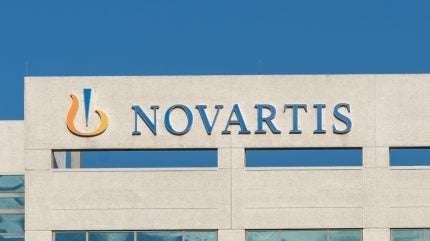
The US Food and Drug Administration (FDA) has approved a label expansion for Novartis’s Kisqali (ribociclib), allowing it to be used as an add-on therapy in early breast cancer patients.
The therapy is approved as a combination treatment with an aromatase inhibitor for the adjuvant treatment of people with hormone receptor-positive/human epidermal growth factor receptor 2-negative (HR+/HER2-) stage II and III early breast cancer at high risk of recurrence, including those with node-negative (N0) disease.

Discover B2B Marketing That Performs
Combine business intelligence and editorial excellence to reach engaged professionals across 36 leading media platforms.
Kisqali is a cyclin-dependent kinase (CDK) 4 and 6 inhibitor. The FDA first approved Kisqali and aromatase inhibitor combination therapy in postmenopausal HR+/HER2- advanced or metastatic breast cancer patients in 2017. The following year, the US regulatory agency expanded the Kisqali label to HR+/HER2- advanced or metastatic breast cancer irrespective of the patient’s menopausal status.
The FDA also approved the therapy’s use in combination with fulvestrant as both first-line and second-line treatment in postmenopausal women with advanced breast cancer.
Kisqali is a high-grossing cancer therapy for Novartis having raked in $2bn in sales last year and has generated $1.34bn in sales in the first half of 2024, according to company financials. GlobalData expects the therapy’s global sales to increase to more than $8bn by 2030.
GlobalData is the parent company of Pharmaceutical Technology.

US Tariffs are shifting - will you react or anticipate?
Don’t let policy changes catch you off guard. Stay proactive with real-time data and expert analysis.
By GlobalDataThe label expansion approval was backed by positive data from the open-label NATALEE trial (NCT03701334). Earlier this week, Novartis presented an exploratory four-year analysis of the study at the European Society for Medical Oncology (ESMO) annual meeting. The ESMO analysis showed that the combination therapy of Kisqali and endocrine therapy (ET) reduced the risk of recurrence by 28.5% after three years of treatment, compared to ET monotherapy.
Kisqali’s main competitor is Eli Lilly’s CDK4/6 inhibitor Verzenio (abemaciclib), which is approved in the same breast cancer indications as Kisqali but use is limited to patients with nodal involvement. Verzenio generated $3.86bn in sales last year, as per Lilly’s financials. GlobalData forecasts Verzenio to remain a competitor to Kisqali, with the former’s sales increasing to more than $8.7bn by 2030 and just edging out Kisqali’s sales in the same period.




